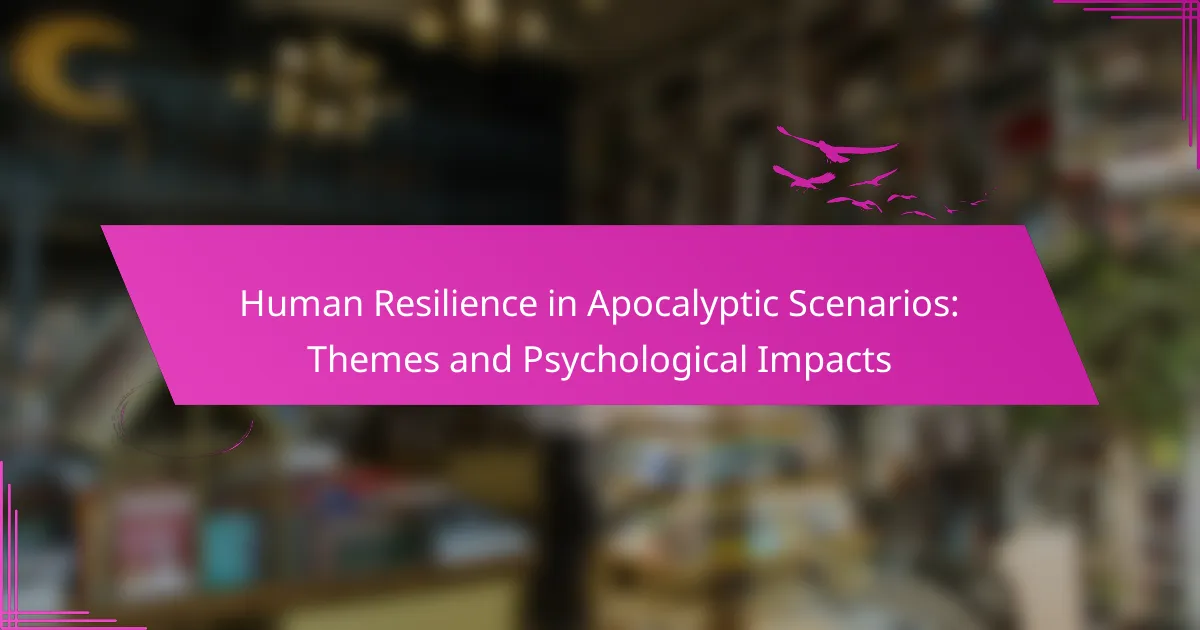Human resilience plays a critical role in navigating apocalyptic scenarios, impacting survival and recovery. Key psychological factors include adaptability, social support, and optimism. Common themes in literature highlight survival instincts and community solidarity. Individual attributes such as emotional intelligence further shape responses to adversity, while proactive strategies can enhance resilience in potential crises.
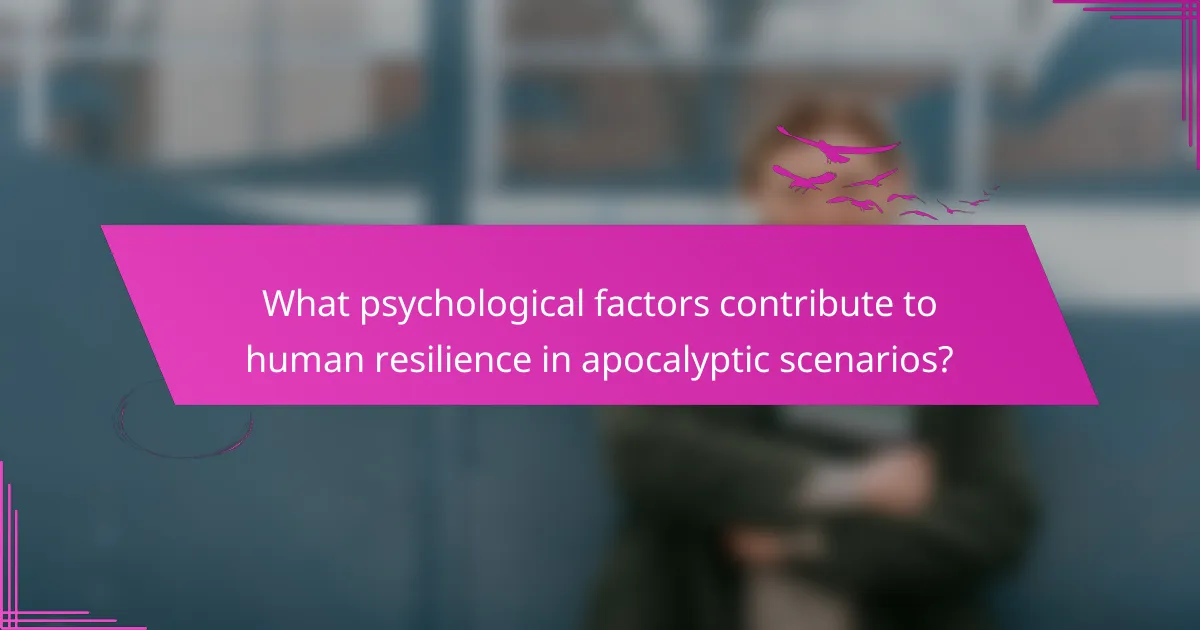
What psychological factors contribute to human resilience in apocalyptic scenarios?
Psychological factors such as adaptability, social support, and optimism significantly contribute to human resilience in apocalyptic scenarios. Adaptability allows individuals to adjust to rapidly changing environments. Social support provides emotional and practical resources, enhancing coping mechanisms. Optimism fosters a positive outlook, motivating individuals to persevere despite adversity. These factors create a robust psychological framework that enables people to withstand extreme stress and uncertainty.
How does trauma influence resilience during catastrophic events?
Trauma can enhance resilience during catastrophic events by fostering adaptability and emotional strength. Individuals often draw on past experiences to navigate crises effectively. This phenomenon occurs as trauma can lead to personal growth, known as post-traumatic growth, where individuals develop a deeper understanding of their capabilities. Resilience is influenced by social support networks, which provide essential emotional and practical assistance during challenging times. Moreover, the ability to find meaning in adversity can significantly bolster resilience, allowing individuals to cope with stressors more effectively.
Which coping mechanisms are most effective in survival situations?
Effective coping mechanisms in survival situations include problem-solving, emotional regulation, and social support. These strategies enhance human resilience, enabling individuals to adapt to extreme stressors.
Problem-solving involves assessing situations and identifying actionable steps to improve outcomes. Emotional regulation helps manage feelings of fear and anxiety, fostering mental clarity. Social support from others provides a sense of belonging and shared experiences, which can mitigate feelings of isolation.
Research indicates that individuals who utilize these coping strategies are more likely to thrive in apocalyptic scenarios. Engaging in these mechanisms can significantly enhance psychological well-being during crises.
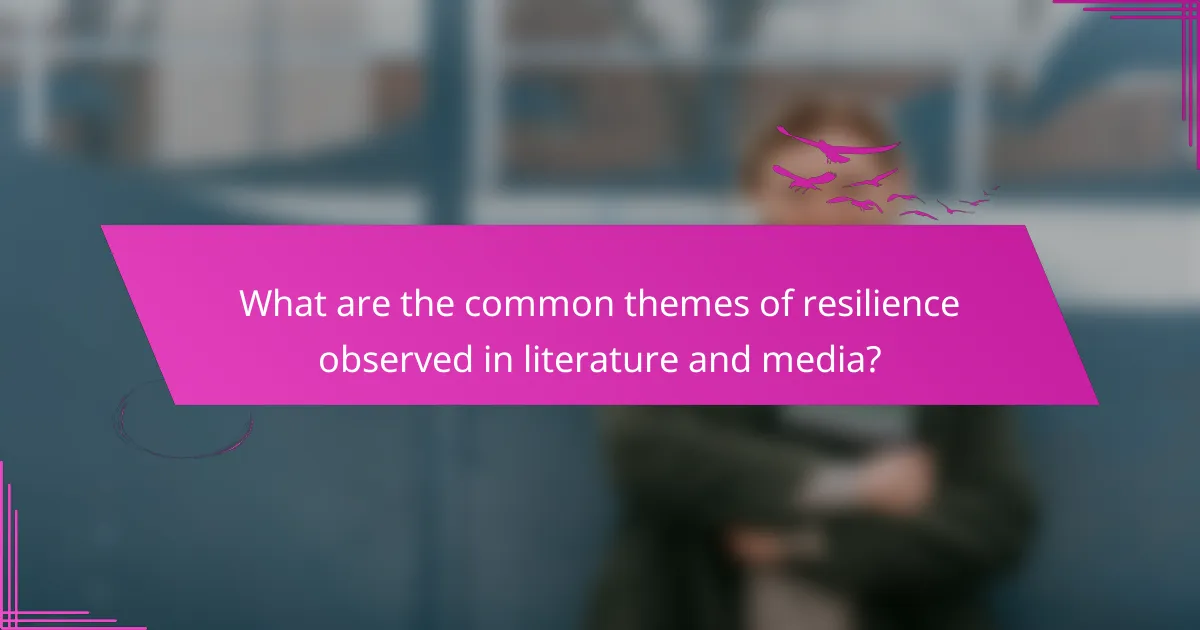
What are the common themes of resilience observed in literature and media?
Common themes of resilience in literature and media include survival instincts, community support, and personal transformation. These narratives often highlight the human capacity to adapt and find hope amid chaos. For example, characters frequently demonstrate resourcefulness, showcasing unique attributes like innovation and emotional strength. Psychological impacts include increased empathy and a reevaluation of values, reflecting a profound change in perspective.
How do narratives shape our understanding of human strength?
Narratives significantly shape our understanding of human strength by illustrating resilience in adversity. In apocalyptic scenarios, stories reveal how individuals adapt, confront fears, and find hope. These narratives often highlight themes such as survival instinct, community support, and personal transformation. Psychological impacts include increased empathy and a sense of agency, empowering individuals to face real-life challenges. Ultimately, these stories reinforce the belief in human resilience, inspiring others to cultivate their strength in difficult times.
Which cultural differences influence the portrayal of resilience?
Cultural differences significantly shape the portrayal of resilience in apocalyptic scenarios. For instance, collectivist cultures often emphasize communal strength, while individualistic cultures highlight personal agency.
In many Eastern cultures, resilience may be depicted through narratives of community support and shared burdens. This contrasts with Western depictions, which often focus on individual heroism and self-reliance.
Additionally, the concept of time influences resilience portrayal. Cultures with a long-term orientation may emphasize endurance and patience, while those with a short-term focus might celebrate quick adaptability.
These cultural frameworks impact psychological responses to apocalyptic events, affecting how resilience is understood and expressed across different societies.
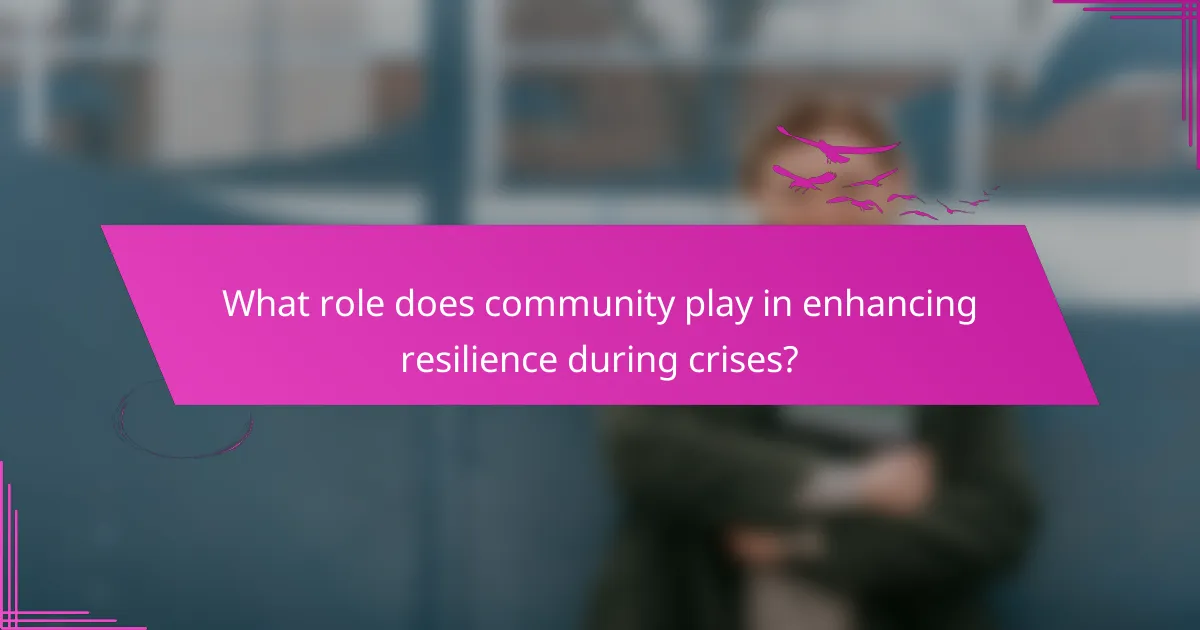
What role does community play in enhancing resilience during crises?
Community plays a crucial role in enhancing resilience during crises by providing support and resources. Social networks foster emotional connections, which help individuals cope with stress. Collective action leads to resource sharing, improving survival chances. Communities often develop adaptive strategies that enhance overall resilience. For example, mutual aid groups can quickly mobilize to assist those in need, showcasing the unique attribute of community solidarity in challenging times.
How do social networks facilitate psychological support?
Social networks provide essential psychological support by fostering community connections and facilitating communication. They enable individuals to share experiences, express emotions, and receive encouragement during challenging times, such as apocalyptic scenarios. This connectivity enhances human resilience, allowing people to cope better with stress and uncertainty. Research shows that social support can significantly reduce feelings of isolation and anxiety, promoting mental well-being. Additionally, online platforms offer access to diverse perspectives and coping strategies, which can be particularly valuable in crisis situations.
What are the benefits of collective action in survival scenarios?
Collective action enhances survival in apocalyptic scenarios by fostering resource sharing, emotional support, and strategic collaboration. These benefits significantly increase the chances of survival and resilience among individuals.
Resource sharing allows groups to pool supplies, ensuring that essential needs are met. This collaboration can lead to more effective problem-solving, as diverse skills and perspectives contribute to innovative solutions. Emotional support strengthens mental resilience, reducing feelings of isolation and despair.
Moreover, collective action can create a sense of community, encouraging individuals to work together towards common goals. As a result, groups can develop adaptive strategies that are more effective than individual efforts. This synergy not only improves survival odds but also enhances overall psychological well-being during crises.
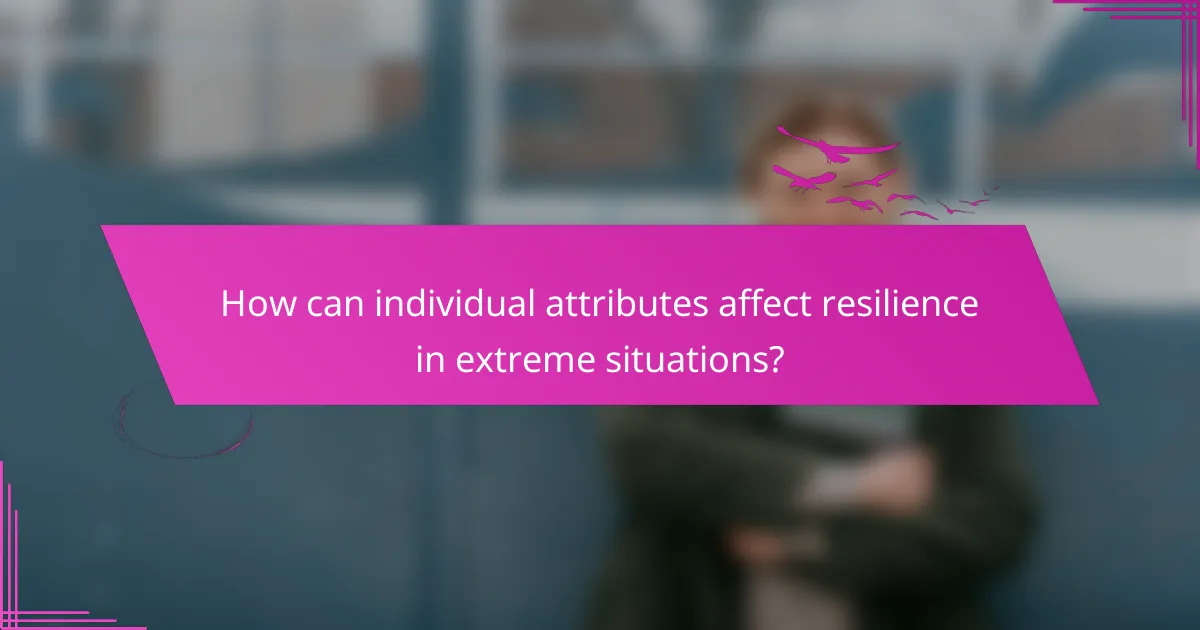
How can individual attributes affect resilience in extreme situations?
Individual attributes significantly influence resilience in extreme situations by shaping responses to stress and adversity. Factors such as emotional intelligence, adaptability, and social support enhance a person’s ability to cope. For example, individuals with high emotional intelligence can manage their emotions effectively, leading to better decision-making in crises. Adaptability allows for quick adjustments to changing circumstances, which is crucial in apocalyptic scenarios. Social support networks provide essential resources and encouragement, bolstering mental strength. These attributes collectively create a robust framework for resilience, enabling individuals to navigate extreme challenges more successfully.
What personal traits are linked to higher resilience levels?
Higher resilience levels are linked to traits such as optimism, adaptability, and emotional regulation. These traits enable individuals to cope effectively in challenging situations. Optimism fosters a positive outlook, while adaptability allows for flexible responses to change. Emotional regulation helps manage stress and maintain focus. Research indicates that these traits can be developed over time, enhancing overall resilience.
Which unique experiences contribute to a person’s resilience?
Unique experiences that contribute to a person’s resilience include overcoming adversity, developing strong social connections, and engaging in meaningful activities. These experiences foster adaptability and enhance coping strategies. For example, individuals who have faced significant challenges often develop a greater sense of self-efficacy. Additionally, supportive relationships provide emotional resources that help individuals navigate difficult situations. Engaging in purposeful activities can also instill a sense of hope and direction, further strengthening resilience.
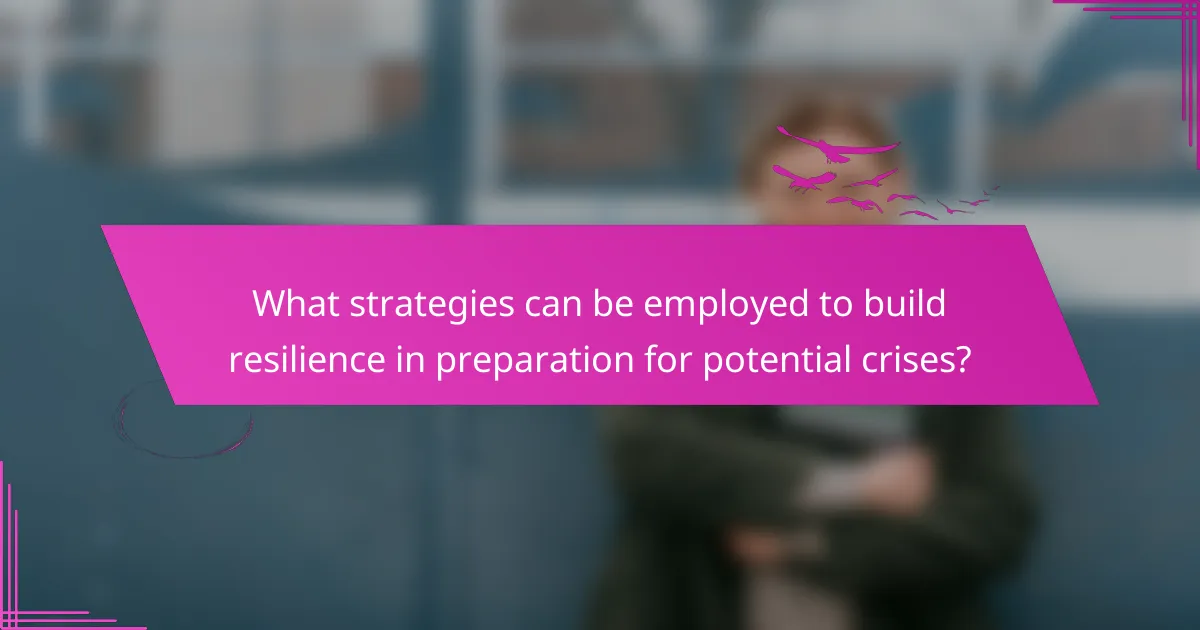
What strategies can be employed to build resilience in preparation for potential crises?
Building resilience for potential crises involves proactive strategies. Individuals can enhance their adaptability and mental strength through various methods.
1. Foster strong social connections to provide emotional support during crises.
2. Develop problem-solving skills to navigate challenges effectively.
3. Practice mindfulness and stress-reduction techniques to maintain mental clarity.
4. Set realistic goals to create a sense of purpose and direction.
5. Engage in regular physical activity to boost overall well-being.
6. Embrace a growth mindset to view challenges as opportunities for learning.
How can mindfulness and mental training enhance coping abilities?
Mindfulness and mental training significantly enhance coping abilities by fostering emotional regulation and resilience. These practices promote awareness of thoughts and feelings, enabling individuals to respond rather than react to stressors. Research indicates that mindfulness can reduce anxiety and improve focus, crucial in high-pressure situations. Training in mindfulness techniques cultivates adaptability, which is essential for navigating challenges in apocalyptic scenarios. Regular practice can lead to lasting changes in brain structure, enhancing the ability to cope with trauma and uncertainty.
What are the best practices for fostering resilience in communities?
Fostering resilience in communities involves building strong social networks, promoting mental health resources, and encouraging adaptive skills. Effective communication and shared goals enhance collective problem-solving. Community engagement initiatives, like workshops and support groups, strengthen bonds and increase resource sharing. Prioritising mental well-being and empowering individuals fosters a culture of resilience.
Which common mistakes should be avoided when developing resilience strategies?
Avoiding common mistakes in resilience strategy development is crucial for effective outcomes. Key mistakes include neglecting individual differences, failing to assess environmental factors, underestimating emotional responses, and not incorporating feedback mechanisms.
1. Overlooking personal strengths and weaknesses can hinder tailored resilience approaches.
2. Ignoring the impact of external conditions may lead to ineffective strategies.
3. Dismissing emotional reactions can result in inadequate support systems.
4. Failing to gather and analyze feedback can prevent necessary adjustments.
